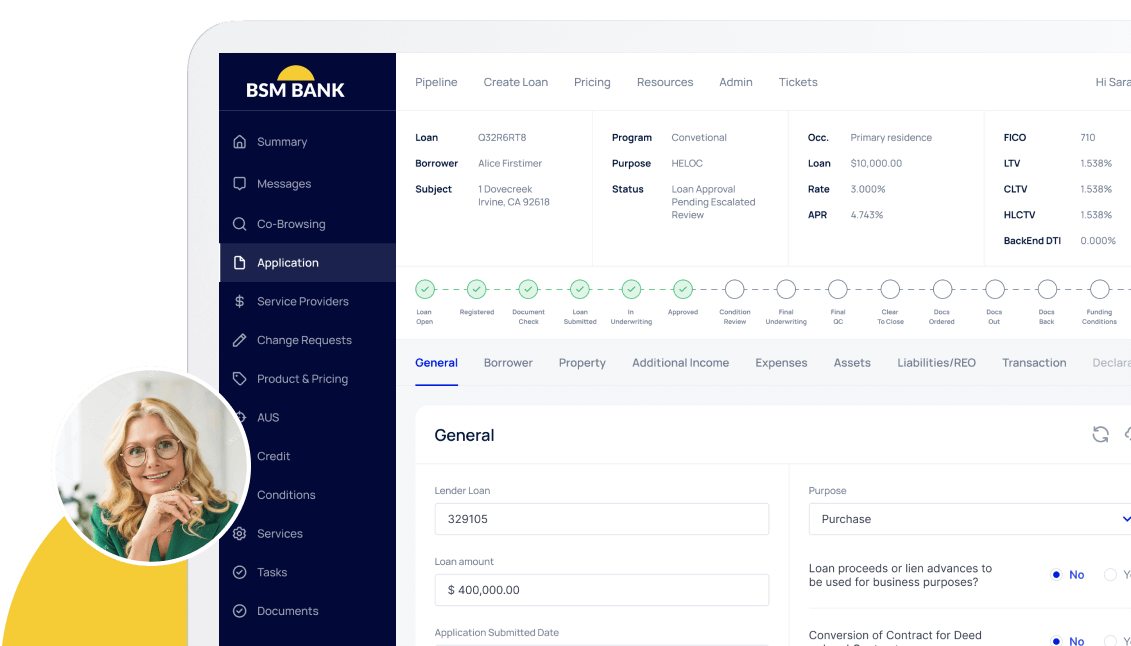Risk analysis is the backbone of mortgage lending. It is how lenders determine whether or not their bet will pay off, and whether the borrower will pay back the loan.
Loan Product Advisor® is Freddie Mac’s automated underwriting system. A computer application that can verify a borrower’s personal information and determine whether or not they should be approved for a mortgage. By giving users access to Freddie Mac’s credit requirements, it allows them to easily identify the overall underwriting risk.
The Basics of Risk-Based Mortgage Pricing
Mortgage lenders offer different interest rates and loan terms to different borrowers based on an assessment of their creditworthiness. Assessments are calculated using criteria including credit scores, payment histories and the loan-to-value ratio of the mortgage.
When deciding whether or not to approve a loan, mortgage lenders gauge the risk that the borrower is likely to default or become delinquent on the loan, and then package their offers accordingly. Applicants in better financial shape, and with better credit histories, will get better rates and terms on their mortgages because they are more likely to pay the loan back in full.
Risk-based pricing is a standard practice in the financial services industry, including in commercial and other lending. However, lenders cannot use legally protected factors in determining the terms of or making approval decisions for mortgage applications. These legal protections include gender, marital status, race and religion. If a borrower is offered less attractive terms or rates based on something found in their credit report, they will usually be informed of the specific reasons from their credit report.
Borrowers who have had a bankruptcy or foreclosure, have recently been unemployed, or have had recent late payments or other credit issues, will be offered loans with a higher interest rate or stiffer terms than those with better financial histories.

What Risk Factors do Mortgage Lenders Consider?
When assessing an applicant’s risk and determining the rates and terms of their mortgage loans, lenders consider three main categories: credit reputation, capacity and collateral.
1. Credit Reputation
Credit reports list your bill payment history, loans, current debt, and other financial information. They show where you work and live and whether you’ve been sued, arrested, or filed for bankruptcy.
A credit score is a number that rates your credit risk. It can help creditors determine whether to give you credit, decide the terms they offer, or the interest rate you pay. Having a high score can benefit you in many ways. It can make it easier for you to get a loan, rent an apartment, or lower your insurance rate.
Credit companies calculate your credit score using information from your credit report. The information that affects your score includes:
- Payment history
- Outstanding balances
- Length of credit history
- Applications for new credit accounts
- Types of credit accounts (mortgages, car loans, credit cards)
Freddie Mac’s Loan Product Advisor requires a tri-merge credit report or 3 In-File. FICO scores must be requested for each borrower. For an Accept Mortgage and an A-minus Mortgage, Loan Product Advisor has determined that the Borrower’s credit reputation is acceptable. In all other situations, the seller must thoroughly evaluate the borrower’s credit reputation in accordance with the requirements set forth in this section and document in the Mortgage file the Seller’s conclusion the reputation is acceptable.
Subscribe to BeSmartee 's Digital Mortgage Blog to receive:
- Mortgage Industry Insights
- Security & Compliance Updates
- Q&A's Featuring Mortgage & Technology Experts
2. Capacity
Capacity refers to the debt-to-income ratio of prospective borrowers. It is determined by the percent of the borrower’s gross monthly income that will go toward paying housing
debt, and the borrower’s established long-term consumer debt as well as other debt obligations. The lower the ratio, the lower the risk and the better the loan terms.

3. Collateral
Collateral is a property or other asset that a borrower offers as a way for a lender to secure the loan.
For a mortgage, the collateral is often the house purchased with the funds from the mortgage. If the borrower stops making loan payments, the lender can take hold of the items or house designated as collateral to recover the losses on their loan. Since collateral offers some security to the lender should the borrower fail to pay back the loan, loans that are secured by collateral typically have lower interest rates than unsecured loans.
For a loan to be considered secure, the value of the collateral must meet or exceed the amount remaining on the loan.
Fannie Mae & Freddie Mac
Fannie Mae and Freddie Mac are government-sponsored enterprises that buy mortgages from lenders. They either hold these mortgages or package and sell them to investors, which enables lenders to use the proceeds from the sale of mortgages to make more loans.
But Freddie and Fannie have to be careful about what loans they purchase. Loan Product Advisor helps them assess risk.
LPA reviews borrower information submitted by lenders and compares that data to Fannie and Freddie’s guidelines, and then approves or denies the application.

BeSmartee’s Digital Mortgage Solution Makes it Easy to Submit Borrower Information to the AUS
It is lucrative for lenders to submit borrower information speedily and accurately. In order for the LPA system to work, borrower information needs to be accurate, truthful, complete and supportable. The BeSmartee point-of-sale (POS) platform automates verification and ensures the accuracy of borrower information that is submitted through the guided application. It will notify loan officers of missing, incomplete, or incorrect information, helping to ensure that the information submitted to the AUS achieves certainty on the first try. This is faster and more accurate than handling information manually, which will delight your borrowers and lighten your team’s workload.
For a demonstration of how the BeSmartee digital mortgage platform makes it fast and easy for lenders to take an application to close, request a consultation today.




